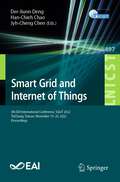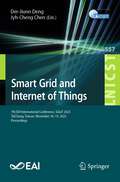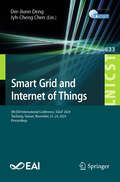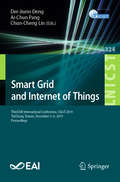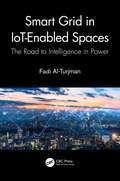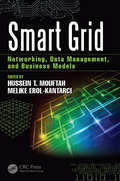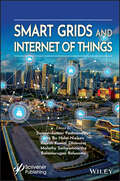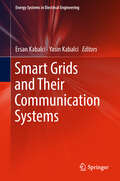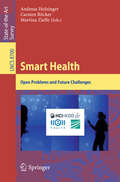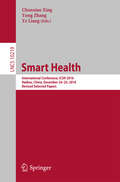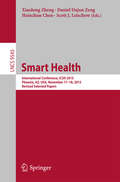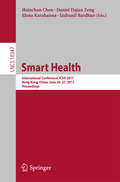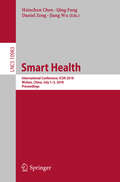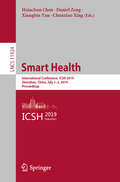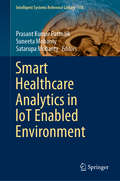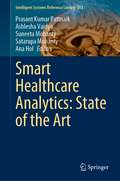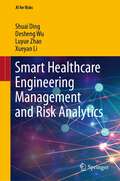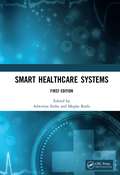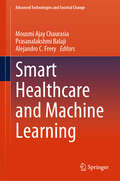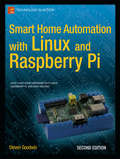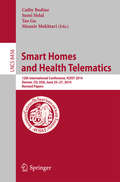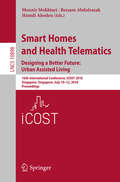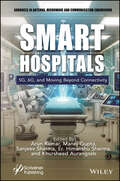- Table View
- List View
Smart Grid and Internet of Things: 6th EAI International Conference, SGIoT 2022, TaiChung, Taiwan, November 19-20, 2022, Proceedings (Lecture Notes of the Institute for Computer Sciences, Social Informatics and Telecommunications Engineering #497)
by Han-Chieh Chao Der-Jiunn Deng Jyh-Cheng ChenThis book constitutes the refereed proceedings of the 6th EAI International Conference on Smart Grid and Internet of Things, SGIoT 2022, held in TaiChung, Taiwan, in November 19-20, 2022.The 33 regular papers presented were carefully reviewed and selected from 96 submissions. The papers cover a broad range of topics in wireless sensor, vehicular ad hoc networks, security, deep learning and big data. The papers are organized in subject areas as follows: IoT, Communication Security, Data Mining or Big Data; Artificial Intelligence, Machine Leaning, Deep Learning and Neural Network; WLAN, Wireless Internet and 5G; Protocol, Algorithm, Services and Applications.
Smart Grid and Internet of Things: 7th EAI International Conference, SGIoT 2023, TaiChung, Taiwan, November 18-19, 2023, Proceedings (Lecture Notes of the Institute for Computer Sciences, Social Informatics and Telecommunications Engineering #557)
by Der-Jiunn Deng Jyh-Cheng ChenThis book constitutes the refereed proceedings of the 7th EAI International Conference on Smart Grid and Internet of Things, SGIoT 2023, held in TaiChung, Taiwan, in November 18-19, 2023The 15 regular papers presented were carefully reviewed and selected from 38 submissions. The papers are organized in subject areas as follows: IoT, communication security, data mining and big data; WLAN, wireless internet and 5G; protocol, algorithm, services and applications.
Smart Grid and Internet of Things: 8th EAI International Conference, SGIoT 2024, Taichung, Taiwan, November 23–24, 2024, Proceedings (Lecture Notes of the Institute for Computer Sciences, Social Informatics and Telecommunications Engineering #633)
by Der-Jiunn Deng Jyh-Cheng ChenThis book constitutes the refereed proceedings of the 8th EAI International Conference on Smart Grid and Internet of Things, SGIoT 2024, held in Taichung, Taiwan, during November 23–24, 2024. The 19 full papers included in this book were carefully reviewed and selected from 45 submissions. They were organized in topical sections as follows: IoT, Artificial Intelligence, Edge Computing; Wireless Sensor Network, Mobile Robot, Smart Manufacturing; and Protocol, Algorithm, Services and Applications.
Smart Grid and Internet of Things: Third EAI International Conference, SGIoT 2019, TaiChung, Taiwan, December 5-6, 2019, Proceedings (Lecture Notes of the Institute for Computer Sciences, Social Informatics and Telecommunications Engineering #324)
by Der-Jiunn Deng Chun-Cheng Lin Ai-Chun PangThis book constitutes the refereed proceedings of the Third EAI International Conference on Smart Grid and Internet of Things, SGIoT 2019, held in TaiChung, Taiwan, in November 2019. The 10 papers presented were carefully reviewed and selected from 22 submissions and present results on how to achieve more efficient use of resources based largely on the IoT-based machine-to-machine (M2M) interactions of millions of smart meters and sensors in the smart grid specific communication networks such as home area networks, building area networks, and neighborhood area networks. The smart grid also encompasses IoT technologies, which monitor transmission lines, manage substations, integrate renewable energy generation. Through these technologies, the authorities can smartly identify outage problems, and intelligently schedule the power generation and delivery to the customers. Furthermore, the smart grid should teach us a valuable lesson that security must be designed in from the start of any IoT deployment.
Smart Grid in IoT-Enabled Spaces: The Road to Intelligence in Power
by Fadi Al-TurjmanInternet of Things (IoT)-enabled spaces have made revolutionary advances in the utility grid. Among these advances, intelligent and energy-efficient services are gaining considerable interest. The use of the smart grid is increasing day after day around us and is not only used in saving energy but also in our daily life for intelligent health, traffic, and even farming systems. The grid enabled with IoT features is also expected to communicate with cellular networks smoothly in the next-generation networks (6G and beyond). This will open the door for other interesting research areas. In this book, we consider the most significant and emergent research topics in this domain, addressing major issues and challenges in IoT-based solutions proposed for the smart grid. The chapters provide insight on comprehensive topics in IoT-based smart grids, combining technical aspects with the most up-to-date theory. It investigates the grid under varying and potential emerging paradigms such as edge/fog computing, in addition to big data aspects considerations in the IoT era. With comprehensive surveys and case studies, this book explores basic and high-level grid aspects in the emerging smart city paradigm, which makes it especially attractive to researchers, academics, and higher-level students. This authored book can be used by computer science undergraduate and postgraduate students, researchers and practitioners, city administrators, policymakers, and government regulators.
Smart Grid: Networking, Data Management, and Business Models
by Hussein T. Mouftah Melike Erol-KantarciSmart Grid: Networking, Data Management, and Business Models delivers a comprehensive overview of smart grid communications, discussing the latest advances in the technology, the related cyber security issues, and the best ways to manage user demand and pricing. Comprised of 16 chapters authored by world-renowned experts, this book: Considers the use of cognitive radio and software-defined networking in the smart grid Explores the space of attacks in the energy management process, the need for a smart grid simulator, and the management issues that arise around smart cities Describes a real-time pricing scheme that aims to reduce the peak-to-average load ratio Explains how to realize low-carbon economies and the green smart grid through the pervasive management of demand Presents cutting-edge research on microgrids, electric vehicles, and energy trading in the smart grid Thus, Smart Grid: Networking, Data Management, and Business Models provides a valuable reference for utility operators, telecom operators, communications engineers, power engineers, electric vehicle original equipment manufacturers (OEMs), electric vehicle service providers, university professors, researchers, and students.
Smart Grids and Internet of Things: An Energy Perspective
by Balamurugan Balusamy P. Sanjeevikumar Jens Bo Holm-Nielsen Rajesh Kumar Dhanaraj Malathy SathyamoorthySMART GRIDS AND INTERNET OF THINGS Smart grids and the Internet of Things (IoT) are rapidly changing and complicated subjects that are constantly changing and developing. This new volume addresses the current state-of-the-art concepts and technologies associated with the technologies and covers new ideas and emerging novel technologies and processes. Internet of Things (IoT) is a self-organized network that consists of sensors, software, and devices. The data is exchanged among them with the help of the internet. Smart Grids (SG) is a collection of devices deployed in larger areas to perform continuous monitoring and analysis in that region. It is responsible for balancing the flow of energy between the servers and consumers. SG also takes care of the transmission and distribution power to the components involved. The tracking of the devices present in SG is achieved by the IoT framework. Thus, assimilating IoT and SG will lead to developing solutions for many real-time problems. This exciting new volume covers all of these technologies, including the basic concepts and the problems and solutions involved with the practical applications in the real world. Whether for the veteran engineer or scientist, the student, or a manager or other technician working in the field, this volume is a must-have for any library. Smart Grids and Internet of Things: Presents Internet of Things (IoT) and smart grid (SG)-integrated frameworks along with their components and technologies Covers the challenges in energy harvesting and sustainable solutions for IoTSGs and their solutions for practical applications Describes and demystifies the privacy and security issues while processing data in IoTSG Includes case studies relating to IoTSG with cloud and fog computing machine learning and blockchain
Smart Grids and Their Communication Systems (Energy Systems In Electrical Engineering Ser.)
by Ersan Kabalci Yasin KabalciThe book presents a broad overview of emerging smart grid technologies and communication systems, offering a helpful guide for future research in the field of electrical engineering and communication engineering. It explores recent advances in several computing technologies and their performance evaluation, and addresses a wide range of topics, such as the essentials of smart grids for fifth generation (5G) communication systems. It also elaborates the role of emerging communication systems such as 5G, internet of things (IoT), IEEE 802.15.4 and cognitive radio networks in smart grids. The book includes detailed surveys and case studies on current trends in smart grid systems and communications for smart metering and monitoring, smart grid energy storage systems, modulations and waveforms for 5G networks. As such, it will be of interest to practitioners and researchers in the field of smart grid and communication infrastructures alike.
Smart Health
by Andreas Holzinger Carsten Röcker Martina ZiefleProlonged life expectancy along with the increasing complexity of medicine and health services raises health costs worldwide dramatically. Whilst the smart health concept has much potential to support the concept of the emerging P4-medicine (preventive, participatory, predictive, and personalized), such high-tech medicine produces large amounts of high-dimensional, weakly-structured data sets and massive amounts of unstructured information. All these technological approaches along with "big data" are turning the medical sciences into a data-intensive science. To keep pace with the growing amounts of complex data, smart hospital approaches are a commandment of the future, necessitating context aware computing along with advanced interaction paradigms in new physical-digital ecosystems. The very successful synergistic combination of methodologies and approaches from Human-Computer Interaction (HCI) and Knowledge Discovery and Data Mining (KDD) offers ideal conditions for the vision to support human intelligence with machine learning. The papers selected for this volume focus on hot topics in smart health; they discuss open problems and future challenges in order to provide a research agenda to stimulate further research and progress.
Smart Health
by Yong Zhang Chunxiao Xing Ye LiangThis book constitutes the thoroughly refereed post-conference proceedings of the International Conference for Smart Health, ICSH 2016, held in Haikou, Hainan, China, in December 2016. The 23 full papers presented were carefully reviewed and selected from 52 submissions. They are organized around the following topics: big data and smart health; health data analysis and management; healthcare intelligent systems and clinical practice; medical monitoring and information extraction; clinical and medical data mining.
Smart Health
by Hsinchun Chen Xiaolong Zheng Daniel Dajun Zeng Scott J. LeischowThis book constitutes the thoroughly refereedpost-conference proceedings of the International Conference for Smart Health,ICSH 2015, held in Phoenix, AZ, USA, in November 2015. The 33 papers presented together were carefully reviewedand selected from 43 submissions. The conference focused on topics and issuesincluding medical monitoring and information extraction, clinical and medicaldata mining, health data analysis and management, big data and smart health,and healthcare intelligent systems and clinical practice.
Smart Health
by Hsinchun Chen Daniel Dajun Zeng Elena Karahanna Indranil BardhanThis book constitutes the refereed proceedings of the International Conference for Smart Health, ICSH 2014, held in Beijing, China, in July 2014. The 21 papers presented together with 4 extended abstracts were carefully reviewed and selected from numerous submissions. The papers are organized in topical sections on information sharing, integrating and extraction; health data analysis and management; clinical and medical data mining; and clinical practice and medical monitoring.
Smart Health: International Conference, ICSH 2018, Wuhan, China, July 1–3, 2018, Proceedings (Lecture Notes in Computer Science #10983)
by Daniel Zeng Hsinchun Chen Jiang Wu Qing FangThis book constitutes the thoroughly refereed post-conference proceedings of the International Conference for Smart Health, ICSH 2018, held in Wuhan, China, in July 2018.The 14 full papers and 21 short papers presented were carefully reviewed and selected from 49 submissions. They focus on studies on the principles, approaches, models, frameworks, new applications, and effects of using novel information technology to address healthcare problems and improve social welfare. The selected papers are organized into the following topics: smart hospital; online health community; mobile health; medical big data and healthcare machine learning; chronic disease management; and health informatics.
Smart Health: International Conference, ICSH 2019, Shenzhen, China, July 1–2, 2019, Proceedings (Lecture Notes in Computer Science #11924)
by Daniel Zeng Hsinchun Chen Chunxiao Xing Xiangbin YanThis book constitutes the thoroughly refereed conference proceedings of the International Conference for Smart Health, ICSH 2019, held in Shenzhen, China, in July 2019. The 34 full papers and 1 short papers presented were carefully reviewed and selected from 43 submissions. In this book a lively exchange and collaborations between the growing international smart health research scholars and communities has been introduced, and to advance our understanding about the technical, practical, economic, behavioral, and social issues center on smart health . The selected papers are organized into the following topics: Precision Medicine and Telehealth, Social, Psychosocial and Behavioral Determinants of Health, Data science, Analytics, Clinical and Business Intelligence, Clinical Informatics and Clinician Engagement.
Smart Healthcare Analytics in IoT Enabled Environment (Intelligent Systems Reference Library #178)
by Prasant Kumar Pattnaik Suneeta Mohanty Satarupa MohantyThis book addresses various aspects of how smart healthcare can be used to detect and analyze diseases, the underlying methodologies, and related security concerns. Healthcare is a multidisciplinary field that involves a range of factors like the financial system, social factors, health technologies, and organizational structures that affect the healthcare provided to individuals, families, institutions, organizations, and populations. The goals of healthcare services include patient safety, timeliness, effectiveness, efficiency, and equity. Smart healthcare consists of m-health, e-health, electronic resource management, smart and intelligent home services, and medical devices. The Internet of Things (IoT) is a system comprising real-world things that interact and communicate with each other via networking technologies. The wide range of potential applications of IoT includes healthcare services. IoT-enabled healthcare technologies are suitable for remote health monitoring, including rehabilitation, assisted ambient living, etc. In turn, healthcare analytics can be applied to the data gathered from different areas to improve healthcare at minimum expense.
Smart Healthcare Analytics: State of the Art (Intelligent Systems Reference Library #213)
by Prasant Kumar Pattnaik Suneeta Mohanty Satarupa Mohanty Ashlesha Vaidya Ana HolThis edited book helps researchers and practitioners to understand e-health, m-healthcare architecture through IoT and the state of the art in IoT counter measures. This book provides a comprehensive discussion on a functional framework for IoT-based healthcare systems, intelligent medicine box, RFID technology, HMI, cognitive interpretation, BCI, remote health monitoring systems, wearable sensors, WBAN, healthcare analytics, machine learning (ML) techniques for IoT-enabled healthcare services, security and privacy issues in IoT-based healthcare monitoring systems. The book discusses integration of IoT with big data and cloud computing for solving several real-time problems by the use of smart healthcare applications. In these applications, the cloud computing provides a common workplace for IoT and big data, big data provides data analytics technology and IoT provides the source of data. It serves as a reference resource for researchers and practitioners in academia and industry.
Smart Healthcare Engineering Management and Risk Analytics (AI for Risks)
by Desheng Wu Xueyan Li Shuai Ding Luyue ZhaoThis book aims to stay one step beyond the innovations of information and communication technologies and smart healthcare management and provides an overview of the risks smart healthcare management could help to alleviate, and those risks it would create or amplify. Inclusive discussions of the core of smart healthcare services in the perspective of system engineering are enclosed, such as smart healthcare definition, data information knowledge service, and intelligent hospital management. Summaries of technological and theoretical innovations spanning each step of the modern healthcare system are included, from health screening, clinical diagnosis, cancer screening, to in-hospital mortality monitoring, minimally invasive surgeries, and medical data storages. Analytics of risks reduced and induced by these innovations are provided, with potential solutions to such risks in healthcare management discussed. This book seeks to provide demonstrative examples of incidence capable innovations of healthcare technologies, which, while greatly enhancing abilities of healthcare workers and institutions, could pose risks to patients and sometimes even greater threats to the integrity of the healthcare system. The style of the book is intended to be demonstrative but most suited for researchers and graduate students, explaining the methodology behind healthcare innovations, with some citations and some deep scholarly reference.
Smart Healthcare System Design: Security and Privacy Aspects (Advances in Learning Analytics for Intelligent Cloud-IoT Systems)
by Sk Hafizul Islam Debabrata SamantaThe purpose of this book is to help achieve a better integration between the work of researchers and practitioners in a single medium for capturing state-of-the-art IoT solutions in healthcare applications to address how to improve the proficiency of wireless sensor networks (WSNs) in healthcare. It explores possible automated solutions in everyday life, including the structures of healthcare systems built to handle large amounts of data, thereby improving clinical decisions; which is why this book will prove invaluable to professionals who want to increase their understanding of recent challenges in the IoT-enabled healthcare domain. The 14 chapters address various aspects of the IoT system, such as design challenges, theory, various protocols, and implementation issues, and also include several case studies. Smart Healthcare System: Security and Privacy Aspects covers the introduction, development, and applications of smart healthcare models that represent the current state-of-the-art of various domains. The primary focus will be on theory, algorithms, and their implementation targeted at real-world problems. It will deal with different applications to give the practitioner a flavor of how IoT architectures are designed and introduced into various situations. More particularly, this volume consists of 14 chapters contributed by authors well-versed in the subject who are devoted to reporting the latest findings on smart healthcare system design.
Smart Healthcare Systems
by Adwitiya Sinha Megha RathiAbout the Book The book provides details of applying intelligent mining techniques for extracting and pre-processing medical data from various sources, for application-based healthcare research. Moreover, different datasets are used, thereby exploring real-world case studies related to medical informatics. This book would provide insight to the learners about Machine Learning, Data Analytics, and Sustainable Computing. Salient Features of the Book Exhaustive coverage of Data Analysis using R Real-life healthcare models for: Visually Impaired Disease Diagnosis and Treatment options Applications of Big Data and Deep Learning in Healthcare Drug Discovery Complete guide to learn the knowledge discovery process, build versatile real life healthcare applications Compare and analyze recent healthcare technologies and trends Target Audience This book is mainly targeted at researchers, undergraduate, postgraduate students, academicians, and scholars working in the area of data science and its application to health sciences. Also, the book is beneficial for engineers who are engaged in developing actual healthcare solutions.
Smart Healthcare and Machine Learning (Advanced Technologies and Societal Change)
by Alejandro C. Frery Mousmi Ajay Chaurasia Prasanalakshmi BalajiThe book explores the convergence of healthcare and cutting-edge technology, making it a captivating subject for readers interested in future research. Smart healthcare with machine learning techniques offers a transformative paradigm that utilizes the power of new technology, data analytics, and interconnected devices to enhance the quality, efficiency, and accessibility of healthcare services. This involves leveraging Internet of Things (IoT) devices, wearable technology, and machine learning algorithms to monitor patient health, predict medical conditions, and offer personalized treatment recommendations. This innovative combination not only enhances diagnostics and treatment but also addresses the research challenges of healthcare access and delivery in an increasingly connected world. By exploring the synergy between smart healthcare and machine learning, the book helps to understand how these technologies can collaborate to revolutionize patient care and healthcare delivery. This book is an outcome with applications of future technologies to overcome the toughest humanitarian challenges from an engineering approach.
Smart Home Automation with Linux and Raspberry Pi
by Steven GoodwinSmart Home Automation with Linux and Raspberry Pi shows you how to automate your lights, curtains, music, and more, and control everything via a laptop or mobile phone. You'll learn how to use Linux, including Linux on Raspberry Pi, to control appliances and everything from kettles to curtains, including how to hack game consoles and even incorporate LEGO Mindstorms into your smart home schemes. You'll discover the practicalities on wiring a house in terms of both and power and networking, along with the selection and placement of servers. There are also explanations on handling communication to (and from) your computer with speech, SMS, email, and web. Finally, you'll see how your automated appliances can collaborate to become a smart home. Smart Home Automation with Linux was already an excellent resource for home automation, and in this second edition, Steven Goodwin will show you how a house can be fully controlled by its occupants, all using open source software and even open source hardware like Raspberry Pi and Arduino.
Smart Home Hacks: Tips & Tools for Automating Your House
by Gordon MeyerSo much of what is commonplace today was once considered impossible, or at least wishful thinking. Laser beams in the operating room, cars with built-in guidance systems, cell phones with email access. There's just no getting around the fact that technology always has, and always will be, very cool.But technology isn't only cool; it's also very smart. That's why one of the hottest technological trends nowadays is the creation of smart homes.At an increasing rate, people are turning their homes into state-of-the-art machines, complete with more switches, sensors, and actuators than you can shake a stick at. Whether you want to equip your home with motion detectors for added security, install computer-controlled lights for optimum convenience, or even mount an in-home web cam or two purely for entertainment, the world is now your oyster. Ah, but like anything highly technical, creating a smart home is typically easier said than done.Thankfully, Smart Home Hacks takes the guesswork out of the process. Through a seemingly unending array of valuable tips, tools, and techniques, Smart Home Hacks explains in clear detail how to use Mac, Windows, or Linux to achieve the automated home of your dreams. In no time, you'll learn how to turn a loose collection of sensors and switches into a well-automated and well-functioning home no matter what your technical level may be.Smart Home Hacks covers a litany of stand-alone and integrated smart home solutions designed to enhance safety, comfort, and convenience in new and existing homes. Kitchens, bedrooms, home offices, living rooms, and even bathrooms are all candidates for smart automation and therefore are all addressed in Smart Home Hacks.Intelligently written by engineering guru and George Jetson wannabe, Gordon Meyer, Smart Home Hacks leaves no stone unturned. From what to purchase to how to use your remote control, it's the ultimate guide to understanding and implementing complete or partial home automation.
Smart Homes and Health Telematics
by Cathy Bodine Sumi Helal Tao Gu Mounir MokhtariThis book constitutes the thoroughly refereed post-conference proceedings of the 12th International Conference on Smart Homes and Health Telematics, ICOST 2014, held in Denver, CO, USA in June 2014. The 21 revised full papers presented together with three keynote papers and 9 short papers were carefully reviewed and selected from numerous submissions. The papers are organized in topical sections on Design and Usability, assistive and sentient environments, cognitive technology, activity recognition, context and situation awareness, Health IT and short contributions.
Smart Homes and Health Telematics, Designing a Better Future: 16th International Conference, ICOST 2018, Singapore, Singapore, July 10-12, 2018, Proceedings (Lecture Notes in Computer Science #10898)
by Mounir Mokhtari Hamdi Aloulou Bessam AbdulrazakThis book constitutes the proceedings of the 16th International Conference on Smart Homes and Health Telematics, ICOST 2018, held in Singapore, Singapore, in July 2018. The theme of this year volume is "Designing a better Future: Urban Assisted Living", focusing on quality of life of dependent people not only in their homes, but also in outdoor living environment to improve mobility and social interaction in the city. The 21 regular papers and 11 short papers included in this volume focus on research in the design, development, deployment and evaluation of smart urban environments, assistive technologies, chronic disease management, coaching and health telematics systems.
Smart Hospitals: 5G, 6G and Moving Beyond Connectivity
by Manoj Gupta Sanjeev Sharma Arun Kumar Er. Himanshu Sharma Khursheed AurangzebDiscover the potential of 5G, 6G, and smart hospitals beyond connectivity in Smart Hospitals: 5G, 6G, and Moving Beyond Connectivity and learn how these advancements are revolutionizing healthcare and the digital world. The advancement of wireless communication technologies has revolutionized the way we connect and interact with the digital world. The introduction of 5G networks has paved the way for faster, more reliable, and low-latency wireless connections. However, as technology continues to evolve, the focus is now shifting toward exploring the future potential of 5G and 6G and their applications in various industries. One such industry that stands to benefit significantly from these advancements is healthcare, particularly with the concept of smart hospitals. The development of smart hospitals relies on IT infrastructure, software solutions, and data management systems. IT professionals and software developers work with healthcare professionals on designing and implementing systems that enable seamless connectivity, data integration, analytics, and security in smart hospital environments. Smart Hospitals: 5G, 6G, and Moving Beyond Connectivity delves into the potential of 5G, 6G, and smart hospitals, highlighting how they go beyond mere connectivity.
